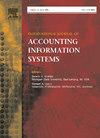A practical guide to implementing ChatGPT as a secondary coder in qualitative research
IF 6
3区 管理学
Q2 BUSINESS
International Journal of Accounting Information Systems
Pub Date : 2025-07-15
DOI:10.1016/j.accinf.2025.100754
引用次数: 0
Abstract
Analyzing interview data provides in-depth insights into qualitative research topics, but is often a time-consuming and costly process. This research aims to enhance this process by leveraging transformative technologies influencing the accounting field, like ChatGPT. ChatGPT is capable of generating human-like text and performing text-based analyses by using a pre-trained model. Specifically, this research illustrates ChatGPT’s role as a secondary coder in deductive qualitative accounting research, analyzing interview transcripts using content analysis with a predefined coding scheme. Data was collected through semi-structured interviews with 36 business economics students. First, the primary researcher manually analyzed the data using a deductive approach. Next, a second human researcher and ChatGPT (ChatGPT-4o Plus) were appointed as secondary coders to independently verify and validate the coding. The paper demonstrates ChatGPT’s potential to assist in coding interview transcripts, emphasizing its role as a supplementary tool in qualitative research. The coding results from both secondary coders were compared with those of the primary human coder, revealing over 99% agreement for both secondary coders. In addition, a step-by-step illustration, best practices, prompts, and critical reflections are shared. This study serves as a foundational step in understanding and leveraging ChatGPT’s use in the analysis of interview transcripts.
在定性研究中将ChatGPT作为辅助编码器实现的实用指南
分析访谈数据可以为定性研究主题提供深入的见解,但通常是一个耗时且昂贵的过程。本研究旨在通过利用影响会计领域的变革性技术(如ChatGPT)来加强这一过程。ChatGPT能够生成类似人类的文本,并通过使用预训练的模型执行基于文本的分析。具体来说,本研究说明了ChatGPT在演绎定性会计研究中作为二级编码器的作用,使用预定义编码方案的内容分析来分析访谈记录。数据是通过对36名商业经济学专业学生的半结构化访谈来收集的。首先,主要研究人员使用演绎法手动分析数据。接下来,第二名人类研究员和ChatGPT (ChatGPT- 40 Plus)被任命为第二编码器,独立验证和验证编码。本文展示了ChatGPT的潜力,以协助编码采访记录,强调其作为定性研究的补充工具的作用。将两个二级编码器的编码结果与主要人类编码器的编码结果进行比较,发现两个二级编码器的一致性超过99%。此外,还分享了逐步说明、最佳实践、提示和关键反思。这项研究是理解和利用ChatGPT在访谈记录分析中的使用的基础步骤。
本文章由计算机程序翻译,如有差异,请以英文原文为准。
求助全文
约1分钟内获得全文
求助全文
来源期刊
CiteScore
9.00
自引率
6.50%
发文量
23
期刊介绍:
The International Journal of Accounting Information Systems will publish thoughtful, well developed articles that examine the rapidly evolving relationship between accounting and information technology. Articles may range from empirical to analytical, from practice-based to the development of new techniques, but must be related to problems facing the integration of accounting and information technology. The journal will address (but will not limit itself to) the following specific issues: control and auditability of information systems; management of information technology; artificial intelligence research in accounting; development issues in accounting and information systems; human factors issues related to information technology; development of theories related to information technology; methodological issues in information technology research; information systems validation; human–computer interaction research in accounting information systems. The journal welcomes and encourages articles from both practitioners and academicians.

 求助内容:
求助内容: 应助结果提醒方式:
应助结果提醒方式:


